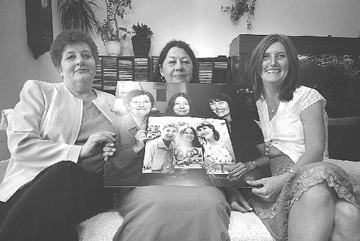By Leonard Quart
“49 Up” is the latest installment of a markedly original documentary series made for English television, directed by Michael Apted (“The Coal Miner’s Daughter”). The series’ aim was to chart the lives of a group of people from age seven and up, revisiting them every seven years.
Its original premise was that there was a powerful relationship between the childrens’ class backgrounds and the way their lives would turn out. But as the films followed these children into adulthood, this idea became less viable. The influence of class couldn’t be dismissed, but what determined a life seemed too unpredictable and complex to be explained by their social origins.
The most striking aspect of Michael Apted’s latest chapter is how much more settled these children — many now grandparents — have become. They are more accepting of themselves, and family is what most of them seem to value most. This sentiment is voiced strongly by Paul and Simon, the two boys who spent their early years in an orphanage. Both have been lucky enough to find strong, vital wives who provide an emotional balance in the lives of these still insecure, fragile men, who are hesitant to work at jobs that would make full use of their potential.
The 12 people who appear in this film run the class gamut, and it’s predictable that being born into the upper middle class and acquiring an Oxford degree still offers greater life options than growing up in London’s East End. And in fact, almost all of the progeny of the working class men and women who appear in the film do not attend university. But these cab drivers and freight handlers never articulate any class resentment. They view it as a choice when their children go to work rather than higher ed, just as they see the lives they lead as primarily determined by their personalities rather than their social backgrounds. Clearly, class has become much less prescriptive in England today than when the series began in the sixties. For example, the bouncy, irrepressible Cockney cab driver Tony (whose supposed charm has always eluded me) has now made enough money to happily spend much of the year on the coast of Spain in a large house with his family and many other Brits like himself. For people like him, class is no barrier to their idea of success.
Apted is an unobtrusive interviewer, but a number of people in the film find being in it an ordeal. They dislike that he exposes their personal lives for public consumption, and feel condescended to by Apted’s questioning. Feisty Jackie, for instance, suffering from rheumatoid arthritis and living with her three children in public housing near Glasgow, angrily tells Apted “you edit our problems as you see fit; I have no control over it.”
In reality, Apted’s questions sometimes grant us too little in the way of personal revelation, and we feel we are given no more than external details about marriages, children, and jobs.
Still, “49 Up” is often powerfully evocative. The intercutting of images from different stages in the characters’ lives makes incredibly graphic what the passage of time does to them physically and emotionally. The most poignant, honest, and complex of these individuals is Neil, who changed from a charming, bubbly seven-year-old to a depressed Dostoyevskian loner at 28, drifting around the Scottish countryside. Now 49, he is living in rural Northwest England and deeply involved in local politics. He is still an awkward solitary, who is given at times to depression, but he is consoled by his religious faith and has achieved greater peace with himself. As Neil says, “life comes once, and it’s quite short, and you have to appreciate what’s good in it.” The same can be said for Apted’s series. One can criticize aspects of each individual film, but the series as a whole is a profoundly ambitious, sometimes transcendent work of art.



































